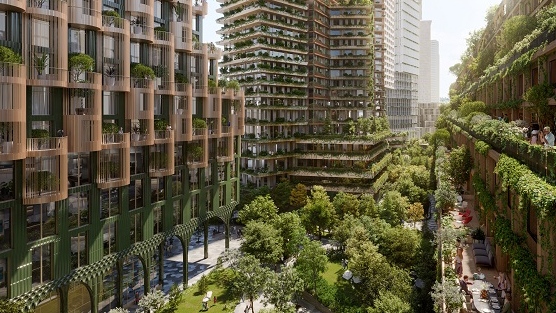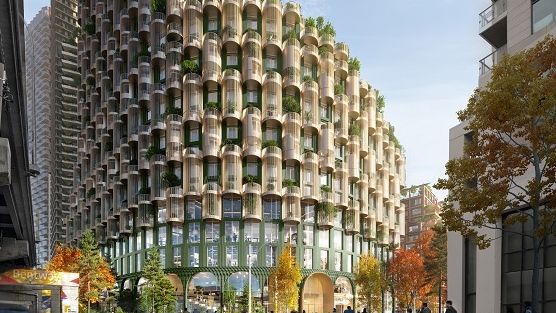Two developers picked to build Quayside neighbourhood on Toronto's waterfront
A plan to transform a 12-acre plot of land on Toronto’s waterfront into a multi-use space with affordable housing and state-of-the-art architecture is one step closer to becoming a reality.
On Tuesday, the city’s Waterfront Toronto group selected two developers, Dream Unlimited Corp. (Dream) and Great Gulf Group, to take the lead on the project and work under the banner of Quayside Impact Limited Partnership.
“This is an important step forward in the future of our waterfront and a crucial step in Toronto's economic recovery,” Mayor John Tory said in a statement. “I am so determined that Toronto's economy will come back stronger than ever in the wake of COVID-19 and this project will be an important part of that recovery.”
Highlights of the project include more than 800 affordable housing units in the first phase of development, a two-acre forested green space, a multi-use arts venue, and an urban farm that will be housed on top of one of Canada’s largest residential mass timber buildings.
The project will also be the first all-electric, zero-carbon community at this scale, Waterfront Toronto said in a news release.
By the end of the project, at least 30 per cent of the residential spaces housed at Quayside will be affordable units owned by the City of Toronto and operated by a non-profit partner, according to city councillor Joe Cressy -- who sits on Waterfront Toronto’s board and represents the Spadina-Fort York riding where the community will be housed.

“Quayside has the potential to help lead our post-pandemic recovery. To bring to life a new vision for how we can build inclusive, mixed-use, affordable, and sustainable neighbourhoods,” Cressy said in a statement.
Torontonians will remember that the space was previously sought after by Google affiliate, Sidewalk Labs. The company had hoped to convert the 12-acre site into a high-tech neighbourhood complete with public wi-fi, heated and illuminated sidewalks and so-called “raincoats” for buildings.
That $1.3 billion proposal had also drawn criticism from privacy experts over its potential use of data and from members of the Indigenous community who accused the company of not doing enough to include recommendations made by the group.
However, Sidewalk Labs bowed out of the development process in May of 2020 due to the “unprecedented economic uncertainty” brought on by the COVID-19 pandemic.
Now, Waterfront Toronto and Quayside Impact Limited Partnership will begin negotiations on a project agreement, which is expected to be completed by the fall of 2022.
In that capacity, Cressy said there will be continued engagement with waterfront communities, stakeholders, and the broader public to bring the project to life.
Pending approval, shovels are expected to be in the ground by 2025 and the first occupancy at the site is targeted for 2030.
With files from CP24's Chris Fox

CTVNews.ca Top Stories

Donald Trump says Canada becoming 51st U.S. state 'a great idea'
U.S. President-elect Donald Trump is taking aim at Canada once more, saying it would be 'a great idea' to make it America's ‘51st state.'
'You're either with Beijing or you're with Washington': Ford says to Mexico in CNN interview
Ontario Premier Doug Ford has a message for Mexico as the threat of tariffs by incoming president Donald Trump hangs over both sides of the U.S. border.
There are 88 new Order of Canada appointees. Here's a look at some of the most notable names
Ryan Reynolds, Scott Oake and Maureen Ann Jennings are among the 88 new recipients of the Order of Canada.
After scamming their victims, some con artists go on to scam our courts with impunity
Convicts, including fraudsters, are skipping out on their court-ordered payments to their victims to the tune of tens of millions of dollars across the country, according to figures obtained by CTV W5.
Synagogue on Montreal's West Island targeted by alleged arson
A synagogue on Montreal's West Island was the target of an alleged arson attack.
Iconic Halifax ship Theodore Too partially sunk at Ontario dock
An iconic ship that was a fixture in Halifax Harbour for 21 years has partially sunk in Ontario.
Canadians return to Canada Post with relief -- and shakier faith in the service
Canada Post trucks, conveyors and mail carriers swung back into motion Tuesday after a month-long strike by more than 55,000 postal workers left letters and parcels in limbo and a massive backlog to sort through.
NEW These seniors were hit by the affordability crisis in a different way. They're having to support their children and grandchildren
With the high cost of living increasingly a concern, some seniors are making sacrifices to help their adult children and grandchildren make ends meet. Here are some of their stories.
Restaurants that charge tax during holiday break could get investigated by CRA: industry expert
Restaurants that fail to honour the holiday tax break could be investigated by the Canada Revenue Tax Agency, according to the Ontario Restaurant Hotel and Motel Association.


































